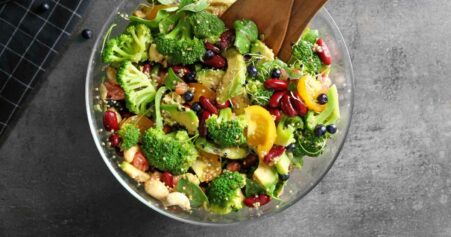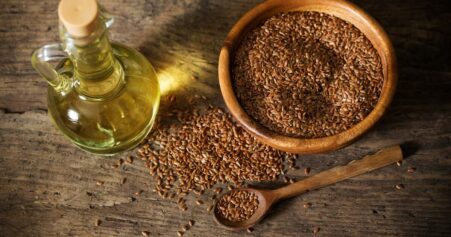Table of Contents
Vegan vitamin D – learn, how to get enough. As a fat-soluble substance, the well-known vitamin D is one of the lipophilic vitamins and thus an essential nutrient. The classic characteristic of a vitamin is the mandatory intake via food. Vitamin D, also known as calciferol, does not completely fulfill this criterion, since your body can produce the substance on its own.
This mechanism takes place in your skin under the stimulus of sunlight, more precisely UV-B radiation. Vitamin D takes over a variety of effects and functions in your organism and can be called a hormone because of this.
Due to the lack of UV-B radiation in northern latitudes, vitamin D deficiency is common in these regions. Especially in the winter as well as spring months, the central European population is considered a risk group (Rabenberg et al., 2015). Due to this insufficient self-synthesis throughout the year, the supply from outside plays a considerable role. Since the substance is only found to a limited extent in plant foods, vegans in particular represent a potentially deficient group, which is why this article focuses on
this vitamin.
Functions

Vitamin D performs essential regulatory functions in your mineral balance, more specifically in calcium and phosphate homeostasis. The substance ensures that a constant calcium level is maintained in the blood. If your calcium requirement increases, vitamin D can intervene in a regulatory way on three levels: first, calcium absorption via the intestine is increased; second, the reabsorption capacity of calcium in the kidney increases; and third, the calcium stored in the bones can be mobilized to bring the blood level to a healthy level (DeLuca, 2004).
With regard to dietary intake, it can be concluded that the absorption of the mineral calcium in the intestine is dependent on the presence of vitamin D.
The lipophilic vitamin also stimulates bone formation by stimulating the bone-building cells known as osteoblasts. Thus, vitamin D not only ensures the regulation of blood calcium levels, but also promotes a healthy bone-building process.
In your organism, there are vitamin D receptors on immune cells, where the essential substance stimulates your immune system on a hormonal level. Thereby, the growth and maturation of defense cells is promoted (Aranow, 2011). The immune-stimulating effect using vitamin D supplements has already been demonstrated in human studies (Prietl et al., 2013).
Vitamin D in Nutrition-Associated Diseases
In addition, the anticarcinogenic, this means cancer-inhibiting, effect of vitamin D has been demonstrated. The substance reacts with an altered division as well as maturation rate of cancer cells, which are ultimately inhibited in their development (Kennel and Drake, 2013). Studies suggest that the protective effect in colorectal cancer is mainly due to vitamin D in combination with adequate calcium intake (Park et al., 2007). From an epidemiological perspective, there is also evidence of the association between low vitamin D status and the occurrence of breast as well as prostate cancer (Garland et al., 2006).
The hormone-active vitamin still represents an interesting object of investigation in research. A variety of protective functions with regard to chronic diseases (hypertension, type 2 diabetes mellitus, autoimmune diseases, rheumatoid arthritis) are still being discussed.
Synthesis and Bioavailability
Your body can produce vitamin D on its own. This requires the UV-B radiation of sunlight on your bare skin to stimulate synthesis. This does not only mean to make arms and legs free from clothes, because the use of sunscreen inhibits the synthesis process. In the summer months (April-September), you may meet your vitamin D needs through self-synthesis by sunlight, and regular outdoor stays of 15-20 minutes are recommended. In the winter months, UV-B radiation in Central Europe is considered too weak to trigger the stimulus of self-synthesis and ensure adequate supply. Other factors, such as air pollution and lifestyle changes with predominantly staying indoors, also reduce the capacity of endogenous vitamin D synthesis (Leitzmann et al., 2013).
An adequate supply of this nutrient through food is considered insufficient, especially in vegan diets. However, not only vegans represent a risk group, because everyone living in Central Europe is considered to be potentially undersupplied in the winter months. For this reason, it is important to ensure that your needs are met, which can be done with the help of supplements if necessary.
Vegan Vitamin D – Supplements
 There are two different forms of vitamin D available as dietary supplements: the plant-based vitamin D2 (ergocalciferol) and the animal-based vitamin D3 (cholecalciferol). The bioavailability of the plant-based and thus vegan preparation, which was originally obtained from UV-B exposed mushrooms, was long considered controversial. In the meantime, however, there are vegan vitamin D3 preparations with good bioavailability on the market that come from lichens and are therefore not of animal origin. Incidentally, lichens are a symbiosis between fungi and algae, which are in a symbiotic community with mutual influence and benefit. Since the natural form of lichens is not digestible for the human digestive tract, extracts or preparations based on lichens are recommended as a good source of vitamin D.
There are two different forms of vitamin D available as dietary supplements: the plant-based vitamin D2 (ergocalciferol) and the animal-based vitamin D3 (cholecalciferol). The bioavailability of the plant-based and thus vegan preparation, which was originally obtained from UV-B exposed mushrooms, was long considered controversial. In the meantime, however, there are vegan vitamin D3 preparations with good bioavailability on the market that come from lichens and are therefore not of animal origin. Incidentally, lichens are a symbiosis between fungi and algae, which are in a symbiotic community with mutual influence and benefit. Since the natural form of lichens is not digestible for the human digestive tract, extracts or preparations based on lichens are recommended as a good source of vitamin D.
Nutritional Status
The current reference value of the EFSA (Adequate Intake, AI) is 15 µg/day to achieve a target level of serum 25 (OH)D concentration of 50 nmol/L (EFSA, 2016). The German Nutrition Society (DGE) issued an estimated value of 20 µg vitamin D per day, which applies to children from the age of 1, adolescents, adults, seniors as well as pregnant and breastfeeding women. This value was quadrupled in 2012 compared to the previous recommendation (5 µg) and refers to the case of lack of self-synthesis. This reference value is based on the fact that the dietary intake of vitamin D was insufficient at that time, since 60% of the German population were not adequately supplied with vitamin D according to international criteria (Gahl, 2012). In particular, people who eat an exclusively vegan diet are considered a special risk group because plant foods have a lower vitamin D content than foods of animal origin.
The individual nutritional status can be determined via blood levels. This is done using the concentration of vitamin D3 (25-hydroxyvitamin D), for which a lower limit value of 50 nmol/L or 20 ng/mL is usually specified.
Deficiency
As can be clearly seen from the functions of vitamin D, an inadequate status leads to impaired calcium balance and bone metabolism. In childhood, this is called rickets, which characterizes the clinical picture of missing or insufficient bone growth. But also the teeth as mineralized hard substance of your body can be affected by a characteristically delayed development. Symptomatically, rickets can be recognized by deformations of the vertebral acid as well as the skeletal muscles.
In adults, long-term vitamin D deficiency leads to decalcification of the skeleton and consequently to a decrease in bone density. This is known as osteoporosis, which is also associated with an increased risk of bone fractures.
The immune-stimulating effect of vitamin D may also decrease, which is why an increased tendency to infections is considered another classic symptom of deficiency.
Studies also indicate that deficient vitamin D status is correlated with certain chronic diseases, such as those of the cardiovascular system (Wang et al., 2008), diabetes mellitus, autoimmune diseases, or certain types of cancers, and an increased risk of mortality can be recorded (Holick and Chen, 2008).
Occurence
You can find vitamin D in very few foods, which is why it is considered unrealistic to be able to cover your needs entirely through food. Plant foods only contain very small amounts of ergocalciferol (vitamin D2). Expressed in numbers, the content amounts to less than 3 µg/100 g. Various types of mushrooms (porcini, chanterelles) can be mentioned as sources. However, by consuming these products, you can only support your vegan vitamin D intake, this is not enough to fully meet your needs. The same applies to the consumption of fortified foods such as dairy alternatives, margarine or breakfast cereals.
Nutritional Status in Vegans
Regardless of the type of diet, the German population, to name one example, does not meet the recommended vitamin D intake level. A deficient status can be observed especially in the winter months (Rabenberg et al., 2015).
Nevertheless, differences in the nutritional status can be observed between people on vegan diets and people with mixed diets. The latter group obtains its vitamin D not only from sunlight but also from foods such as sea fish or milk (products). Their average status is slightly above that of vegans, who can only minimally support their needs via alimentary vitamin D intake. However, it was also shown that the 25-hydroxyvitamin D levels of a vegan group of people without supplementation were within the normal range in the summer months, but barely so in the winter season. Not only vegans, but the entire population should be advised to do regular blood tests, and supplement if necessary.
Summary
As an essential nutrient with hormonal activity, vitamin D has many functions in your body, especially in calcium balance and bone metabolism. Many people in Central Europe do not get enough during the winter months, regardless of their diet. Due to the low content of vegan vitamin D as well as the limited food sources in a purely plant-based diet, vegans in particular are considered a potential risk group. In the first place, it is important to spend time outdoors regularly, especially in the summer months, so that the “sun vitamin” can be produced. Foods such as mushrooms as well as fortified products can provide supplemental support for your needs, but are not enough as a long-term sole source. It is helpful to have your blood levels (25-hydroxyvitamin D) checked regularly and, if needed, to resort to a vegan vitamin D supplement with a dosage of at least 20 µg/day.
The content of this article cannot and should not replace an individual vegan nutrition consultation. In the International Directory for Vegan Nutritionists you can find a vegan expert, in your area locally or online.









Leave a Reply